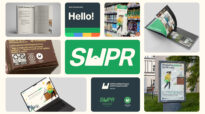The way forward in education: The magic of ‘unicorn assessments’
Written by Diana Varma RGD, Toronto Metropolitan University
The RGD’s The Way Forward in Design Education series captures unique teaching and assessment strategies from educators spanning the continent.
In this edition, Diana Varma RGD, graphic communications lecturer, shares how "unicorn assessments" are changing our industry and our world.
It usually happens when I least expect it. I’m walking the dog or reading a book or driving my kids somewhere and it happens…
I get an idea.
A big and exciting idea related to teaching. I’m compelled to scribble it down, type it out or dictate it into my phone. It’s often a new way to approach a stale subject resulting in an exciting assignment that I know will be valuable and enjoyable for students.
I call these ideas ‘unicorn assessments’.
A unicorn assessment is beneficial for everyone involved, at all stages of the assessment’s lifecycle. It’s an assessment that evaluates student learning in a meaningful way. It is gratifying for the instructor to develop, fun for the learner to complete and (dare I say?!) enjoyable for the instructor to grade. 'Unicorn Assessments' have the unique ability to help increase engagement and quality of work through internally-motivated factors, which improves the educational experience for students and faculty alike. Whether completely original, an updated version of an earlier concept or a remixed idea incubated in someone else’s mind, I wholeheartedly believe that inspiration for these ideas is abundant and ever-present. Unicorn Assessments have five primary qualities, some or all of which may be found within a single assignment.
- Experiential (learning through doing)
- Practical (the finished work or practiced methodology can be directly used or applied outside of the classroom)
- Timely (establishing relevance to ‘the bigger picture’; important societal trends, ideas and movements in the world)
- Offers Choice (in how and/or what students explore within a larger topic umbrella)
- Injects Humour (an appropriate level of lightheartedness to act as a connector)
In my role as a full-time Lecturer in The Creative School at Toronto Metroplitan University (erstwhile Ryerson University), I make a habit of developing Unicorn Assessments. It’s one of my very favourite parts of the job. After two challenging years of less-than-optimal learning conditions, I believe that there has never been a better time to inject a bit of ‘fun with purpose’. Some of my recent favourites include inviting students to:
Play ‘Typographic Supermarket Sweep’, asking them to hunt for unique typesetting in the wild. (“Small caps in aisle 7!”)
Experiential, Offers Choice, Injects Humour
Explore the Art & Science of Typography; a ‘choose your own adventure’ assignment that invites students to dissect and compare two similar typefaces, explore the intricacies of a non-Latin alphabet system or create a podcast episode to explain the history of type through the lens of a single typeface (to name a few).
Experiential, Practical, Timely, Offers Choice
Write a digitally-published article about digital publishing. The top articles are professionally published in a partner industry trade magazine.Experiential, Practical, Timely, Offers Choice
Assemble a paper poly mask as part of a graphic communications processes course in which students use their fine motor skills to cut, score, fold and assemble the mask while sitting across from (and gently forced to interact with) their classmates. It was like taking a time machine back to teaching in a mythical pre-cell phone world!
Experiential, Practical, Injects Humour
Craft a short, yet powerful written piece modelled after the phenomenal concept, Humans of New York. "Humans of Interdisciplinary Innovation" invites students to share a journey of transformation, encouraging vulnerability, trust and empathy-building through storytelling within a cohort of students.
Experiential, Practical, Timely
But I certainly don’t have all the answers.
I love learning from my colleagues and hearing about their creative approaches to course assessment items. This is why I’m thrilled to have had the opportunity to sit down with four design educators in Canada and the United States to learn more about their Unicorn Assessments; the assignments, projects and group work that make their classrooms a place of growth for all involved.
Within these four conversations, a myriad of important pedagogical insights came into view: providing students no-stakes opportunities to practice new skills, positioning topics in ways that are fun and accessible, scaffolding assignments, accountability in group work, gamification, designing beyond the purpose of ‘pretty’, experiencing shared humanity in the classroom and beyond, managing anxiety, learning to trust the process and normalizing failure.
From May through August, I will summarize, synthesize and share the work of one educator each month, including how their Unicorn Assessments are changing our industry and our world, one student at a time.
Dr. AnneMarie Dorland, Assistant Professor, Bissett School of Business at Mount Royal University in Calgary, Alberta. Her work involves helping students understand design ethnography and the important role it can play in deeply understanding a group with the aim of developing creative solutions that fit the group’s unique wants and needs.
Michelle Desgroseilliers, Designer and Part-Time Professor, George Brown College in Toronto, Ontario. Her work involves scaffolding assignments for integrated student learning, as well as experientially incorporating accountability in group work.
Carolina Becerra, Creative Director and Part-Time Educator, British Columbia Institute of Technology in Vancouver, British Columbia. Her work involves asking students to trust in the process of learning and creating while designing work that exists beyond the goal of making something look ‘pretty’, thereby encouraging a classroom with increased empathy, depth of meaning and a sense of a shared humanity.
Douglas Davis, Brooklyn-based Strategist, Author and Professor who is blurring the lines advertising, design and business education. His work involves bringing industry into the classroom and normalizing failure, friction and frustration in the process of producing strategically creative work.
As you rest and recharge over the summer months, I encourage you to learn from these educators’ stories, consider ways you can adopt and adapt their ideas for your own classroom and most importantly, believe in unicorns.
The thoughts and opinions contained within this article do not necessarily reflect the affiliated institution.

Diana Varma RGD
Toronto Metropolitan University
Diana Varma RGD is an award-winning design educator by day and a podcaster by night; getting creative with creatives about all things creative. She is a woman in STEAM who operates a traditional offset printing press, a variety of digital press technologies, as well as engaging in exploratory print-making practices such as LEGO letterpress. She teaches within the School of Graphic Communications Management (GCM) and the Master of Digital Media (MDM) program at Toronto Metropolitan University, as well as through digital learning platform, Domestika.Diana has written 160+ published articles in Graphic Arts Magazine and through the Association of Registered Graphic Designers, as well as 270+ episodes through her podcast, Talk Paper Scissors, speaking with global experts about design, printing, typography, branding, books and publishing. Diana holds the position of VP of Education on the RGD Board of Directors for Canada’s largest professional association for graphic designers and she’s actively involved in organizational initiatives, chairing the RGD’s Education Committee, regularly speaking at conferences and conducting workshops.
Tag
Related Articles


Rupsha Mutsuddi Associate RGD














